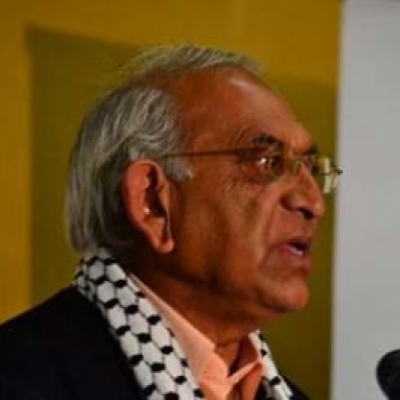



 Iqbal Jassat
Iqbal JassatDespite conflicting statements by Trump regime officials about the reason behind the decision to target Iran's most celebrated military commander, the US is adamant that its assassination of Qassem Soleimani and refusal to leave Iraq is about “protecting Americans”.
From versions advanced publicly by former CIA chief Mike Pompeo now serving as Trump’s trigger-happy Secretary of State, during his TV-road show, the world was told that General Soleimani was killed because he posed an “imminent” threat.
This “official” narrative was spun to convince Trump’s domestic audience that though the Democrats had ganged up against him, he remained concerned about America’s safety and thus eliminated the “bad” guys.
The targeted assassination of General Soleimani and a senior Iraqi military leader Abu Mahdi al-Mohandis, has raised serious questions about Trump’s real motivation. Notwithstanding the so-called justification being vague, unproven claim of “imminent” threat of violence against Americans, Trump himself shot it down by saying that it “doesn’t really matter” whether General Soleimani and al-Mohandis posed an imminent threat.
In other words, as commander-in-chief of America, I, Donald Trump can authorize the killing of anyone, regardless of whether the person singled out for extra-judicial execution is a serving official of a country, and it matters not whether the person poses any imminent threat.
Strangely, the facts advanced by Iraq’s parliament particularly by Prime Minister Adel Abdul-Mahdi regarding the reason for General Soleimani’s visit to Baghdad on the fateful day he was assassinated, have either been downplayed or ignored.
In addition, the Iraqi parliamentary session reveals how the emergence of China and development of strong ties with Baghdad may be shaping America’s new Mideast strategy.
Clearly one cannot ignore what has been described as one of the most overlooked yet relevant drivers behind Trump’s current policy with respect to Iraq: preventing China from expanding its foothold in the Middle East.
Indeed, some commentators have argued that the timing of the assassination of Iran’s top general was directly related to his diplomatic role in Iraq and his push to help Iraq secure its oil independence.
Prime Minister Abdul-Mahdi’s insistence that America’s pressure on the Iraqi government arises from China’s growing ties especially in the oil sector, hasn’t received adequate media attention.
This may be due to much covert US pressure being exerted on the caretaker Iraqi government, and behind closed doors.
Now that the Iraqi Prime Minister has lifted the lid on Trump’s bullying tactics, mainstream media has no reason to shy away from it.
The evidence strongly suggests that America under Trump refuses to countenance China’s presence nor Iran’s substantial influence in Iraq.
The flip side is that both China and Iran are eager to free Iraq by ridding it of US troops. Both have different means to do so which has the potential to saddle Trump with the prospect of his army exiting in ignominy.
The Trump regime is thus faced with a huge dilemma: how to depart gracefully yet retain a presence?
It knows that parliamentary approval to remove American forces along with all foreign troops, means the end of the road.
Challenging it, as Pompeo is doing, is unsustainable and to defy Iraq is in effect defying international conventions.
The martyrdom of General Qassem Soleimani, commander Abu Mahdi al-Mohandis and a number of their colleagues on Iraqi soil, is the straw that proverbially broke the camel’s back.
Far from attaining any of Trump’s stated objectives, the targeted killings have had results entirely unfavorable to his goals.
Iran is firmly united behind its revolutionary leadership, while Trump is facing impeachment trial in a country deeply divided.
The notion of US superpower status is in tatters while Iran’s regional status has grown immensely.
China’s entry will have further ramifications for the US. As one commentator explained: “China has the means and the ability to dramatically undermine not only the US’ control over Iraq’s oil sector but the entire petrodollar system on which the US status as both a financial and military superpower directly depends.”
